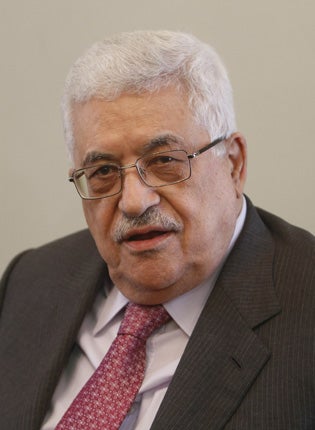Palestinian leader hits back at claims that he 'sold out' to Israel

Your support helps us to tell the story
From reproductive rights to climate change to Big Tech, The Independent is on the ground when the story is developing. Whether it's investigating the financials of Elon Musk's pro-Trump PAC or producing our latest documentary, 'The A Word', which shines a light on the American women fighting for reproductive rights, we know how important it is to parse out the facts from the messaging.
At such a critical moment in US history, we need reporters on the ground. Your donation allows us to keep sending journalists to speak to both sides of the story.
The Independent is trusted by Americans across the entire political spectrum. And unlike many other quality news outlets, we choose not to lock Americans out of our reporting and analysis with paywalls. We believe quality journalism should be available to everyone, paid for by those who can afford it.
Your support makes all the difference.Palestinian officials were scrambling yesterday to head off a mounting political crisis by claiming that thousands of leaked communiqués documenting unprecedented concessions in favour of Israel were a mixture of fabrications and distortions.
The Arab news channel Al Jazeera started publishing the first of nearly 1,700 leaked transcripts and diplomatic communiqués on Sunday, offering a tantalising glimpse of more than a decade of backroom peace talks between Israel and the Palestinians.
Mahmoud Abbas, the embattled Palestinian leader, claimed the documents were "confused" and a deliberate misrepresentation of the Palestinian position. "What is intended is a mix-up," Mr Abbas said. "I have seen them yesterday present things as Palestinian but they are Israeli. This is therefore intentional."
The extent of the disclosures embarrassed Palestinian officials, who were portrayed as weakened and diminished partners prepared to make unprecedented concessions to Ehud Olmert's administration on some of the most intractable and divisive issues in Middle East peace talks.
A new batch of papers released yesterday evening indicated that the Palestinians agreed to proposals that would involve the return of a token number of refugees, a position privately voiced by Palestinians before. In particular, the two sides appeared to agree on the return of 1,000 refugees every year for 10 years.
Palestinian chief negotiator Saeb Erekat, who features prominently in the leaked papers, at one point refers dismissively to refugees as a "bargaining chip" and rules out giving Palestinians living in Lebanon or Jordan the opportunity to vote on a final peace agreement in a referendum.
Tzipi Livni, then Foreign Minister, is also recorded as suggesting the transfer of Israeli Arab residents in areas straddling the Green Line to Palestinian control in exchange for land swaps.
The latest documents also map Palestinian frustrations at the Obama administration's refusal to view 1967 borders as a basis for negotiations – a key concession wrung out of the Bush administration.
Senior Palestinian officials accused Al Jazeera of a campaign to smear the Palestinian Authority and bring about its collapse through the damaging revelations, which had opened with disclosures that the Palestinians had been willing to cede sovereignty of most of Jerusalem. Israel rejected the offer.
The leaks come at a critical time when US-sponsored peace talks have stalled over the issue of Jewish settlements on occupied territory, which the Palestinians want as the basis of their future state, with East Jerusalem as its capital. Washington has been trying to find a formula to bring the two sides back to the negotiating table.
The revelations were viewed as proof that Israel has been the unwilling partner in peace talks, refusing to consider the far-reaching Palestinian concessions, although it remains doubtful if the Ramallah leadership could sell it to an electorate wearied by fruitless talks.
"The leaked documents completely discredit the claim that there is 'no peace partner'," wrote Akiva Eldar in the liberal Ha'aretz newspaper. "The documents are testimony that the Palestinians are willing to go the distance for peace."
Israel refused to comment, merely indicating that Mr Olmert had also offered substantial concessions to the Palestinians, all of which had been rejected.
Even if the documents are seen to vindicate the Palestinians, they are likely to add to the pressure faced by Mr Abbas and his Fatah party. The moderate leader has seen his popularity wane in light of floundering peace talks.
Al Jazeera is preparing to leak more documents, including papers showing the Palestinian leadership was tipped off by Israel regarding its military offensive to rout Islamist movement Hamas in Gaza two years ago.
Hamas, a fierce rival of Fatah and which has control in Gaza, said the leaks revealed "the ugly face of the [Palestinian] Authority and the level of its cooperation with the occupation".
History of peace talks
* 1993 and 1995 Oslo Accords: Signed by Yasser Arafat and Yitzhak Rabin. Intended to provide for Palestinian "self rule" leading to a permanent agreement by 1996. Never brought to fruition although its division of the West Bank into Areas A, B and C [60 per cent of the territory, still under direct Israeli control] remains.
* 2000 Camp David: Bill Clinton-brokered talks between then Israeli Prime Minister Ehud Barak and Yasser Arafat, finally foundering with no agreement on Jerusalem and refugees. Breakdown helped to lead to the second intifada.
* 2003 Geneva: Unofficial accord between Yossi Beilin, a left-leaning Israeli politician, and Yasser Abed Rabbo, of the PLO leadership. Often quoted by moderates on both sides as a model for a future two-state agreement.
* 2007-08 Annapolis: Talks between Mahmoud Abbas/Ahmed Qureia and Ehud Olmert/Tzipi Livni, ends in 2008 Olmert offer: Israel gets all big East Jerusalem settlements, including Har Homa, along with four West Bank blocs. Not taken up by Palestinians.
Join our commenting forum
Join thought-provoking conversations, follow other Independent readers and see their replies
Comments